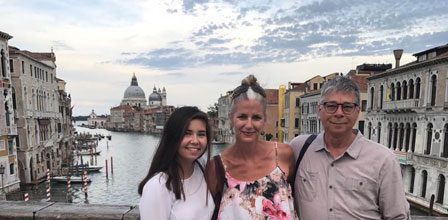 Travel is fatal to prejudice, bigotry, and narrow-mindedness, and many of our people need it sorely on these accounts. Broad, wholesome, charitable views of men and things cannot be acquired by vegetating in one little corner of the earth all one’s lifetime. – Mark Twain
Travel is fatal to prejudice, bigotry, and narrow-mindedness, and many of our people need it sorely on these accounts. Broad, wholesome, charitable views of men and things cannot be acquired by vegetating in one little corner of the earth all one’s lifetime. – Mark Twain
I hear Twain’s sentiment expressed often enough today, and I always find it a little condescending, and -– if I may be so bold – just plain wrong. I believe it’s perfectly possible to acquire broad, wholesome, charitable views of men and things (and even women!) in one little corner of the earth -– where one need not be resigned to “vegetating,” as long as one has a healthy curiosity, a local library, and -– nowadays – access to the Internet. One need not go wide in order to go deep – just look at Emily Dickinson, for example, or Flannery O’Connor – and I always sense in Twain and his modern counterparts a not-so-broad, not-all-that-wholesome, none-too-charitable attitude – smacking of narrow-mindedness, bigotry and prejudice, even! –toward those who haven’t had the good fortune to travel widely. (Ahem. People like me.)
Having said that, fortune recently blew me a kiss, which is why I started writing this essay on a homebound plane from Rome, having just spent two weeks traipsing around Italy with my husband and daughter. Not counting a cruise I took with my mom to Norway – where it rained in almost every port and we mostly stayed on the boat – it was my first serious European vacation. I’m not sure my views are any broader or more charitable now than they were before I left – and I’m almost certain they’re not more wholesome -– but I sure had a great time. And I learned a few things.
We spent the first week in the mountains of Tuscany, in a picturesque village called Castiglione D’Orcia. (You may have seen our villa advertised right here in Lowcountry Weekly. Check it out!) The town was just a two-hour drive from Florence, and even closer to Siena, so we spent a day in each of those storied cities. I learned that you can’t see a storied city in a day, and you probably need a week to do Florence properly. I also learned that, like me, my daughter is not a “museum person.” We both tend to feel stuffy and nauseated and a little trapped in museums. We’d rather be walking the city streets, breathing fresh air, and meeting people, than moving slowly, like cattle, through the Uffizi. Actually, Amelia loved the “city streets” more than I did. I was so wild about our Tuscan village that I was typically itching to get back there by day’s end.
With apologies to Twain, I think could “vegetate” in Castiglione, D’Orcia for the rest of my life, perfectly content under the Tuscan sun, where little stone houses have big blue-green doors, lines of billowing laundry vie for attention with fields of bright poppies, and geraniums wink from the windowsills. In the mornings, I’d stroll to the grocery store or the bakery – “Buon Giorno!” I’d call to passersby, and “Ciao!” – and at night, the moon shone softly on the ruins of an 8th Century castle in our backyard, turning it rose-gold. In the early evenings, we’d drink wine on the porch above the olive garden, and the neighbor’s calico cat would climb right into my lap. (Lots of cats in Tuscany.) It was heaven. I’d found my Spirit Place. I never wanted to leave.
But then came Venice. Still pining for Tuscany after our four-hour drive, I boarded the vaporetto (“water bus”) that would take us to our B&B, and thoughts of my beloved village faded as we wafted down the Grand Canal, bedazzled and beguiled. Ah, Venezia! If cities were things, you would be an antique jewel-encrusted music box. With velvet lining, secret compartments, and a thousand hidden surprises. My first sight of St. Mark’s Basilica happened at dusk that first night. Maybe it was just the good wine I’d had with dinner, but as we walked into St. Mark’s Square and I beheld the cathedral for the first time – and yes, you ‘behold’ St. Mark’s – I burst into tears. In the gloaming, it was gossamer . . . almost transparent. A diaphanous mirage or a fairy castle or something out of Tolkien. Sparklers were twirling through the twilight -– Indian boys were selling them to tourists – and a small orchestra was playing a waltz, while somewhere else in the square, strains of accordion music added to our delight. (A Venetian miracle!) Amelia took my hand and whispered, “Mom, this is what I always dreamed Italy would be like.”
For three days, we were spellbound. Our last night there, we had dinner at a cafe along the Grand Canal, where the forecast rain gallantly declined to materialize, and we wandered home through the fragrant, twisty streets feeling a bit like a 13-year-old girl saying goodbye to a boy -– her first love! – on the last night of summer camp. (Or maybe that was just me.)
How could our final stop - Rome – possibly compare?
Fortunately, it didn’t even try. It didn’t need to. Rome is so different from Venice that comparing the two cities is the proverbial apples to oranges. (Have I mentioned that I love apples and oranges?) I’d been whining to my friend Mark, via email, about leaving Venice for Rome -– I just didn’t want to! – and he wrote back, “Ah, Roma. A more ancient experience, a crossroads of culture and religion. Where Venice is all about wealth and power and all the trappings of a great city state, Rome is about empire. And the reminders are everywhere. The Coliseum, the Forum – all the usual places – are all impressive. But the Pantheon took my breath away. I still remember walking in as a kid and looking up in awe.”
And all these years later, that’s what we did, too. “Awe” is the proper response to Rome, where everything is simply enormous. The Coliseum, the Forum, the Pantheon . . . and, of course, the narrative. You never forget, not once – even while enjoying all the comforts of contemporary Europe – that you are smack-dab in the cradle of Western Civilization. (And if you do forget, you’ll find yourself in the shadow of Marcus Aurelius or Hercules soon enough. Instant reminder.) Even if you’re not a “museum person,” you can’t help being moved -– and probably brought to tears a few times – while working your way through the Vatican Museums, where ancient Egypt blurs into ancient Rome, which weaves its way into Anno Domini, which then merges with the Middle Ages, only to explode into the glorious, fresco-hued Renaissance. Some of our favorite places were those we just “stumbled on” – no lines, no tickets -– like the churches of St. Ignatius Loyola and Santa Maria sopra Minerva. To slip into these holy spaces from the rowdy, sexy streets of 21st Century Rome is to be reminded – in powerful terms – that the sacred and profane are family. First cousins, maybe even siblings. Indivisible and inseparable. Together forever.
So what other profundities did I bring home from Italy?
* Though Rome is big, most things in Italy are small. Plates, cups, toilet paper rolls, band aid boxes, paper towels, bathrooms, showers, kitchens, doorways . . . All weirdly small.
* Italians don’t do ice. If you want your water or your Coca Cola on ice, you have to ask for it. (Warning: Coke is not so good at room temp.)
* Despite their disdain for ice, Italians prize water and Coca Cola. You will pay for both through the nose.
* Always order the house wine. It comes by the liter or half liter, it’s cheap, and it’s good! (This makes up for the expensive, lukewarm Cokes.)
* Italians have silly electrical outlets that aren’t like ours and aren’t even always like each other. If you buy nothing else for your trip, get a universal converter!
* Italians in big cities speak decent English. (They know that we do not speak Italian, and seem resigned to doing the heavy lifting of communication.) Italians in small villages don’t speak a lick of English, but are pretty good at talking with their hands. You’ll get good, too.
* If you learn no other Italian phrase before you go, learn “non capisco.” (“I don’t understand.”) This comes in especially handy in the cities, where people are always trying to sell you something on the street.
* Speaking of which . . . if a charming Indian man tells you you’re beautiful and hands you a red rose, or a charming African man slips a bracelet onto your wrist, it is not a gift. He will shame your husband into paying for it. Or, as in my case, your husband will shame him into slinking off toward his next victim.
All in all, I’m not sure I was disabused of any prejudices toward Italians. I was predisposed to like them, and I did. But as we stood in line at customs in the Detroit airport, having just flown in from Rome by way of Paris, I was never so glad to hear people speaking American English. Southern American English, no less. The couple in front of us were headed back to Athens, Alabama, just a few miles from my hometown. They were delightful, and their heys and y’alls sounded so sweet to my ears. Growing up, I always thought Athens folks were a little red-necky. I guess I was wrong.
And, come to think of it, maybe Twain was right.
Pictured above: That’s us in Venice!
Margaret Evans is the editor of Lowcountry Weekly. (Read more of her Rants & Raves or visit her blog at www.memargaret.com)





